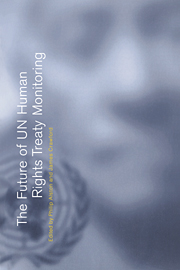Book contents
- Frontmatter
- Contents
- List of Tables, Figure, Appendices
- Notes on Contributors
- Editors' Preface
- Table of Treaties
- Table of Cases
- List of Abbreviations
- 1 The UN human rights treaty system: A system in crisis?
- A The UN human rights monitoring system in action
- B National influences and responses
- C Regional and sectoral comparisons
- D Common challenges for the treaty bodies
- 18 The problem of overlapping among different treaty bodies
- 19 Bodies of knowledge: A diversity promotion role for the UN High Commissioner for Human Rights
- 20 Treaty bodies responding to states of emergency: The case of Bosnia and Herzegovina
- 21 Ensuring effective supervisory procedures: The need for resources
- 22 Servicing and financing human rights supervision
- E Looking to the future
- Index
19 - Bodies of knowledge: A diversity promotion role for the UN High Commissioner for Human Rights
Published online by Cambridge University Press: 23 December 2009
- Frontmatter
- Contents
- List of Tables, Figure, Appendices
- Notes on Contributors
- Editors' Preface
- Table of Treaties
- Table of Cases
- List of Abbreviations
- 1 The UN human rights treaty system: A system in crisis?
- A The UN human rights monitoring system in action
- B National influences and responses
- C Regional and sectoral comparisons
- D Common challenges for the treaty bodies
- 18 The problem of overlapping among different treaty bodies
- 19 Bodies of knowledge: A diversity promotion role for the UN High Commissioner for Human Rights
- 20 Treaty bodies responding to states of emergency: The case of Bosnia and Herzegovina
- 21 Ensuring effective supervisory procedures: The need for resources
- 22 Servicing and financing human rights supervision
- E Looking to the future
- Index
Summary
Introduction: consolidation and diversity
In his 1997 final report on the human rights treaty bodies, Philip Alston proposed an expert group study of the modalities for consolidating the six treaty bodies. But neither in his final report nor in the interim report submitted to the World Conference on Human Rights in 1993 did Alston specifically discuss the consolidation issue. Instead he referred to the discussion in an earlier (1989) report in which he had presented consolidation into ‘one or perhaps two new treaty bodies’ as ‘[t]he most radical option’ that had yet been put forward to address mounting problems such as system overload, resource constraints, and the burdensome proliferation of reporting duties on states. In that 1989 report, Alston signalled that long-term consolidation may eventually warrant serious consideration, but the general focus of his discussion at that time was that consolidation might well prove retrogressive. Without taking a position, he addressed some potentially problematic aspects of consolidation in the following terms:
many of the advantages [of consolidation] can equally well be portrayed as disadvantages, and vice versa, depending on the assumptions and perspectives of the observer … It can be argued that the super-committee would, by virtue of its extensive purview and probably almost permanent sessions, develop enormous expertise. […]
- Type
- Chapter
- Information
- The Future of UN Human Rights Treaty Monitoring , pp. 403 - 438Publisher: Cambridge University PressPrint publication year: 2000
- 1
- Cited by



